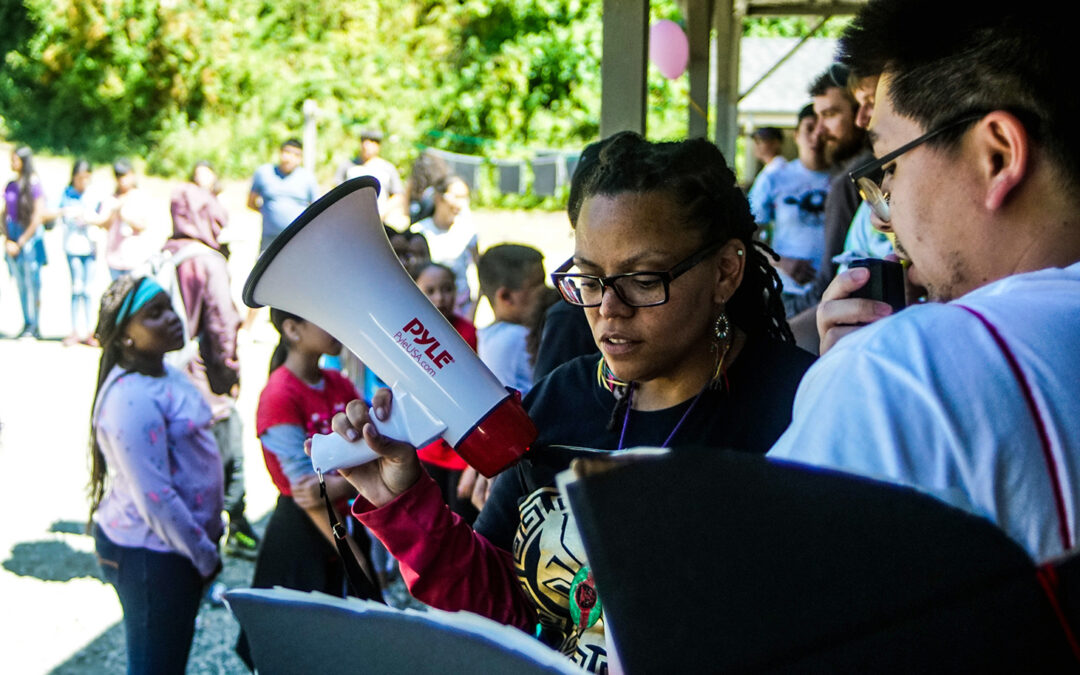The following article appeared in the Spring 2021 issue of Thacher, the magazine of The Thacher School. To view the original article, click here.
How Tyfahra Singleton CdeP 1996 went from hating camping to running a summer camp for Oakland’s youth.
What kind of work do you do?
Since 2019, I’ve been the executive director of Camp Phoenix, a nonprofit that closes the opportunity gap by offering an affordable three-week immersive summer camping experience for roughly 100 middle-schoolers each summer. Our programs combine academics with outdoor fun and adventure and social-emotional and environmental learning.
How did you get to Thacher?
I came to Thacher from South Central LA through the A Better Chance Program. I picked Thacher because I was interested in riding horses, but once I got there, I didn’t love it, especially the part where you rise at 5 a.m. daily to pick up horse poop. Once I finished my requirement, I didn’t get on a horse again.
What did you do after Thacher?
After Thacher, I went to Oberlin, which was just what I needed. After never getting anything better than a B in English at Thacher, my first paper at Oberlin was an A-. I was well prepared. I had developed a love of languages at Thacher and ended up double majoring in Comp Lit and English, eventu- ally ending up at Cal for a doctorate. My dissertation considered jazz as an archive of American trauma; think of Billie Holiday’s Strange Fruit.
How did you end up running a camp?
When I was still in academia, I noted the lack of people of color, so I gravitated toward teaching in places that might change that. But education reform is stressful and political, so I gravitated toward this summer camp and the healing it could offer young people from my community. So, in some ways, I came to Camp Phoenix for a personal escape and realized that it was also a healing remedy for the students. There is no better antidote to generational trauma than intentional community and the joy and fun of healing together, especially when you are gathering in nature.
How do your experiences in the outdoors influence what you do at Camp Phoenix?
I hated camping and hiking at Thacher and felt terrified every time. So I get it when our campers arrive, often scared and homesick; I know how deep those feelings can run. Most of our campers report having very little connection to nature in their normal routines, so we don’t throw them out into the wilderness. We start with day hikes and offer increasingly more challenging experiences. We try to overcome the illusion of a disconnection from nature; it is a myth of systemic racism that we help them unlearn. We acknowledge the Ohlone peoples whose land the camp occupies and talk about our ancestors’ relationships with the land, about stewardship.
What might Thacher’s horse and outdoor programs be able to learn from Camp Phoenix?
Generations of exclusion from nature makes it such that, when we students from excluded backgrounds get our first reintroduction to nature, it can be mired in a culture of systemic oppression and elitism. Although I appreciated every moment I got to be completely alone in nature at Thacher, I found the camping program to be overly competitive and defined by an intensity that did not work for me. I eventually found a different way of experiencing the outdoors, on my own terms and as part of a mutually supportive community. My hope is that that is more in line with Thacher’s Outdoor Program today. The important thing is to provide each of us—and especially growing children—ways of accessing nature that will allow healing if we need it and a fuller understanding and expression of our own humanity.
Having made it through 2020, how has your view of your work changed?
Like all schools and camps, ours suffered when we were unable to hold sessions in person. Yet, as difficult as the pandemic and the re-witnessing of systemic racial injustices have been, they have changed others’ outlook towards our work. Funders more easily understand the healing power of joy in nature for Black and Brown youth. I see an increase in compassion and a willingness to give. And something else happened: My 10-year-old dissertation, which linked lynching and police brutality to other traumas my community has borne, saw a 5,000 percent increase in downloads. As people were finally ready to see these connections, I joined the Oakland Police Commission, and UC Berkeley offered me a visiting scholar appointment to finally publish my research.
What’s next for Camp Phoenix?
I’m actively exploring the possibility of finding new venues for our camp and we are grateful to have been offered the use of Golden Trout to expand our program as soon as covid-19 is under control and we can raise the funds. We’ve also been helped recently by fellow CdePers in setting up a Thacher friends of Camp Phoenix group. Rachel Reinhard, one of our most loyal supporters, is married to Chris Johnston CdeP 1993 and they have helped attract a growing Thacher group of supporters—including Chris’s parents, David and Phyllis Johnston—who all understand how powerful experiences in nature can be.

